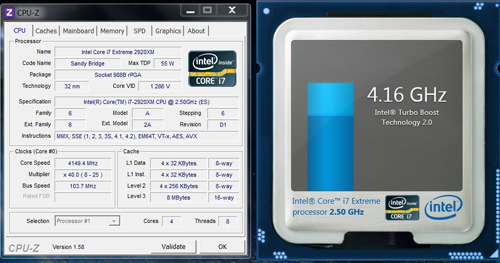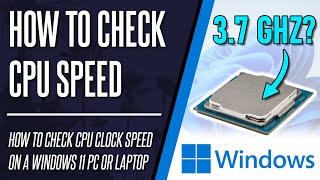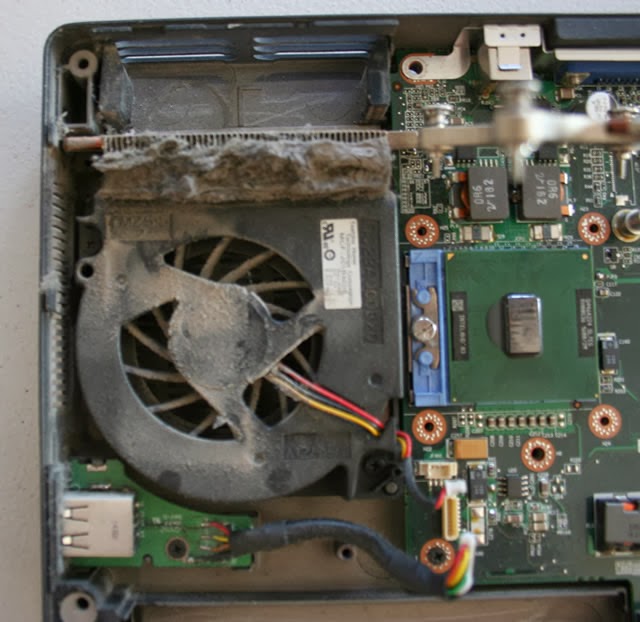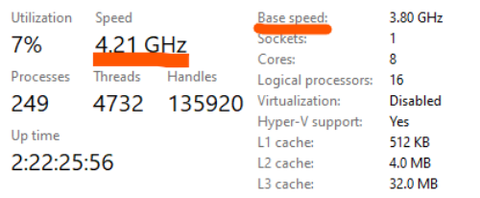Exploring Laptop Performance: What is Ghz And How Does It Matter?
Introduction
Have you ever wondered what GHz means when going through laptop specifications? It often seems like a complicated term, and you may feel that understanding it does not make much of a difference. But knowing what GHz is and how it influences a laptop's performance can be tremendously helpful, especially if you're planning to purchase a new laptop. This article explains GHz, decodes its significance, and sheds light on some common misconceptions. Read on to better arm yourself with knowledge about this crucial laptop specification.

What does GHz Mean in Laptop Specifications?
The term GHz may seem like a complex jargon while scanning laptop specifications. However, unraveling its meaning will offer a clearer understanding of the device's performance.
- Definition: GHz, standing for Gigahertz, is a measure that portrays the speed at which a processor, specifically, a laptop's Central Processing Unit (CPU), can execute tasks. Put simply, it calculates the number of cycles that the CPU can process per second.
- Unit of Measurement: To comprehend it in more straightforward terms, if a laptop features a 2.5 GHz processor, it means that the CPU can tackle approximately 2.5 billion cycles every second.
- Indicator of Speed: Primarily, a higher GHz signifies a swifter processor, thereby indicating the potential speed of the laptop. However, it's vital to remember that GHz isn't the only defining factor of a laptop's performance.
- Illustration: To illustrate, compare the GHz to the 'mileage' – the number which indicates how efficient your car is. Similar to a car, a laptop can also have high 'mileage', i.e., a high-value GHz. It indicates that your processor's efficiency is high, but is not singularly responsible for the overall performance of your laptop.
Thus, while GHz is an essential aspect of laptop specifications, it's crucial not to solely rely on it when gauging a laptop's functionality. It only represents one piece of the bigger picture.
How Does GHz Indicate About Your Processor?
The function of GHz in determining the performance of your processor is a pivotal aspect to understand, whether you’re a tech enthusiast or just curious about how your laptop works. Here's a simplified take on what GHz indicates about your processor:
- Speed Indicator: Essentially, GHz is the speedometer of your processor. A higher GHz implies a faster processor that can execute more tasks per second. Imagine it as the velocity at which your processor can 'analyze and react'.

- Instruction Execution: A processor with a superior GHz rating can perform numerous instruction cycles per second. For instance, if you’ve got a 3.0 GHz processor, it will perform approximately 3 billion actions every second.
- Smooth Operation: The GHz of your processor directly impacts how swiftly your applications load and run, affecting your user experience. A higher GHz processor might mean smoother video streaming, faster game loads, and efficient multi-tasking.
However, remember these key points:
- Co-dependency on Other Factors: While GHz is important, your processor's performance also relies on other elements such as the processor's efficiency and the number of cores.
- Not Always Directly Proportional: Higher GHz does mean a faster processor, but it's not directly proportional to the overall performance of your laptop.
Understanding GHz and its influence on your processor can help you assess your laptop's capabilities and performance accurately. However, it's a piece of the puzzle, and considering other factors like processor cores and efficiency is essential for a complete picture.
How Does GHz Affect Laptop's Performance?
The GHz of a processor is essentially a measure of how fast it can process data. This clock speed is crucial in dictating how quickly your laptop will execute specific tasks, which directly affects your user experience. However, the GHz underscores several factors, such as:
- Application Performance: A higher GHz translates to your applications loading faster and running smoother. This enhanced speed is beneficial for high-end software like video editing applications or intensive games, where the faster execution of tasks reduces lags significantly and facilitates efficient operations.
- Multitasking Capabilities: A greater GHz also means improved multitasking capabilities. You're more likely to experience a seamless switch between multiple running applications with a higher GHz.
On the flipside, simple activities like browsing or checking emails will hardly even register the difference in GHz:
- Everyday Tasks: Typical everyday tasks, like word processing or web browsing, do not require a high GHz processor. As such, a standard GHz will suffice to efficiently carry out these tasks without a hitch.
Contrary to the popular belief that every laptop user needs the highest GHz, the reality is quite different. The degree to which GHz affects your laptop's performance strongly correlates with the type of activities you execute on your laptop. Always identify your system requirements beforehand, and invest in a laptop, considering your unique requirements, rather than blindly following the 'higher GHz is better' hearsay.
Is a Higher GHz Always Better? Dispelling the Myths
The easy assumption that more GHz implies a better laptop is quite often misguided. Though a higher GHz indicates a faster processing speed, it's not the sole determinant of a laptop's overall performance. Here are a few critical points that you need to understand about a high GHz value:
- Increased Power Intake: A high GHz leads to more power consumption. If you're constantly on the move and heavily rely on your laptop's battery life, a high GHz may prove counterintuitive due to its higher power needs.
- Heat Generation: More GHz means more heat output from your laptop. Without proper cooling mechanism in place, a high GHz processor could easily become a liability, impacting both performance and hardware longevity.
- Multi-Tasking Efficiency: For tasks involving simultaneous processing on different fronts, such as video editing or running complex simulations, having multiple cores working at slower speeds can be more beneficial than a single, high GHz speed core.
- The Nature of Your Tasks: For everyday tasks like web browsing or checking emails, a high GHz isn't necessary. But when it comes to graphic-intensive gaming or 3D modelling, a laptop with a high GHz processor might be desired.
The GHz indeed says something about your laptop's speed potential, but it isn't a standalone metric for performance. When purchasing a laptop, it's important to consider other features like number of cores, thermal design, battery life, along with GHz. Balancing these various aspects will ultimately lead you to an ideal laptop suited for your specific needs and preferences.
How to Consider GHz When Purchasing a Laptop?
Purchasing a laptop involves careful consideration of various factors, including GHz. However, GHz should not be the sole determinant in your decision-making process. Here are some pointers to guide you on how to consider GHz and other related aspects when buying a laptop:
- Identify Your Usage Pattern: The most important step is to understand and define your usage requirements. For lightweight activities like browsing, streaming or word processing, a laptop with a lower GHz will suffice. However, if your usage entails heavy gaming or working with graphic-intensive software, a higher GHz will significantly improve your user experience.
- Multicore and GHz Balance: A higher GHz enhances the speed of your processor. In contrast, more cores promote multitasking and executing concurrent tasks smoothly. Striking a balance between the two will ensure optimum laptop performance.
- Processor Efficiency:
- A high GHz could lead to faster battery drainage and increased heat generation. These two aspects could, in turn, affect the longevity and performance of your device.
- Seek a processor that is energy-efficient to ensure longer battery life and less heat production.
- Evaluate Comprehensive Specifications: Avoid making GHz the decisive factor. Look at the full picture - RAM, storage type and capacity, screen resolution, battery life, and the laptop's cooling system. These elements collectively define the overall performance of the laptop.
By understanding the role GHz plays, alongside the other crucial components, you can make a balanced, informed decision regarding your laptop purchase.
Conclusion
Understanding GHz in a laptop's specifications equips you with crucial knowledge to make a smart buying decision. While a higher GHz could suggest a faster processor, it isn't the only factor to consider for optimal performance. Other components have crucial roles to play too. So, delve deeper, look at the complete picture, and make an informed choice.
Related FAQs about what is ghz in laptop
Why isn't a higher GHz always better?
Higher GHz means the processor works faster, but it also leads to increased heat and power consumption. This can shorten battery life and potentially damage the hardware. Additionally, certain tasks, like multi-threaded applications, benefit more from multiple cores rather than a higher GHz.
What other specifications should be considered alongside GHz?
Alongside GHz, consider the number of cores (more cores can process more tasks simultaneously), the efficiency of the processor, RAM (allows more data to be processed at once), storage type and capacity, screen resolution, battery life, and the laptop's cooling system.
How does GHz work in single vs multicores in processors?
A higher GHz in a single core implies it can execute many tasks rapidly. However, multicores with lower GHz can run multiple tasks simultaneously, enhancing performance in multi-threaded applications. Therefore, balancing GHz and the number of cores is key for optimal performance.







